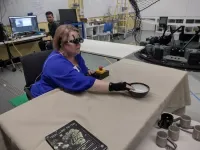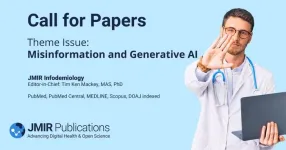(Press-News.org) Over 200 health journals across the world have come together to simultaneously publish an editorial calling on world leaders and health professionals to recognise that climate change and biodiversity loss are one indivisible crisis and must be tackled together to preserve health and avoid catastrophe.
The authors say it’s a “dangerous mistake” to respond to the climate crisis and the nature crisis as if they were separate challenges, and urge the World Health Organization to declare this indivisible crisis as a global health emergency.
The editorial is published in leading titles from around the world, including The BMJ, The Lancet, JAMA, the Medical Journal of Australia, the East African Medical Journal, the National Medical Journal of India and Dubai Medical Journal.
Human health is damaged directly by both the climate crisis and the nature crisis, with the poorest and most vulnerable communities often bearing the highest burden, they write. Rising temperatures, extreme weather events, air pollution, and the spread of infectious diseases are some of the major health threats exacerbated by climate change.
For example, access to clean water is fundamental to human health, yet pollution has damaged water quality causing a rise in water-borne diseases, and ocean acidification has reduced the quality and quantity of seafood that billions of people rely on for food and their livelihoods.
Biodiversity loss also undermines good nutrition and constrains the discovery of new medicines derived from nature, while changes in land use have forced tens of thousands of species into closer contact, increasing the exchange of pathogens and the emergence of new diseases and pandemics.
Communities are healthier if they have access to high-quality green spaces that help filter air pollution, reduce air and ground temperatures, and provide opportunities for physical activity. Connecting with nature also reduces stress, loneliness and depression while promoting social interaction - benefits that are threatened by the continuing rise in urbanisation.
In December 2022 the biodiversity conference (COP) agreed on the effective conservation and management of at least 30% percent of the world’s land, coastal areas, and oceans by 2030. Yet the authors note that the climate and nature scientists who provide the evidence for COPs are largely separate and many commitments have not been met.
“This has allowed ecosystems to be pushed further to the brink, greatly increasing the risk of breakdowns in the functioning of nature,” they warn. “Even if we could keep global warming below an increase of 1.5◦C over pre-industrial levels, we could still cause catastrophic harm to health by destroying nature.”
This risk, combined with the severe impacts on health already occurring, means the World Health Organization should declare the indivisible climate and nature crisis as a global health emergency, before or at the World Health Assembly in May 2024, they write.
Tackling this emergency requires the COP processes to be harmonised, they add. As a first step, the respective conventions must push for better integration of national climate plans with biodiversity equivalents.
Health professionals must be powerful advocates for both restoring biodiversity and tackling climate change for the good of health, while political leaders must recognise both the severe threats to health from the planetary crisis as well as the benefits that can flow to health from tackling the crisis, they say. “But first, we must recognise this crisis for what it is: a global health emergency.”
Kamran Abbasi, Editor in Chief of The BMJ says: “The climate crisis and loss of biodiversity both damage human health, and they are interlinked. That’s why we must consider them together and declare a global health emergency. It makes no sense for climate and nature scientists and politicians to consider the health and nature crises in separate silos.”
He adds: “Health professionals are highly trusted by the public, and they have a central role to play in articulating this important message and advocating for politicians to recognise and take urgent action to address the global health emergency. Over 200 health journals are today sending an unequivocal message.”
The journal editors have supported a petition calling for WHO to declare a global public health emergency at the World Health Assembly in May 2024, which has been launched to coincide with publication of the editorial.
END
Time to treat the climate and nature crisis as one indivisible global health emergency
Over 200 health journals urge the World Health Organization to declare the deadly climate change and nature crisis as a global health emergency
2023-10-26
ELSE PRESS RELEASES FROM THIS DATE:
Vision via sound for the blind
2023-10-26
ustralian researchers have developed cutting-edge technology known as “acoustic touch” that helps people ‘see’ using sound. The technology has the potential to transform the lives of those who are blind or have low vision.
Around 39 million people worldwide are blind, according to the World Health Organisation, and an additional 246 million people live with low vision, impacting their ability to participate in everyday life activities.
The next generation smart glasses, which translate visual information into distinct sound icons, were developed by researchers from the University of Technology Sydney and the University of Sydney, ...
New study reveals inequities in access to mechanical circulatory support in US patients with cardiogenic shock
2023-10-26
SAN FRANCISCO – A new study presented today at TCT 2023 sought to evaluate the presence of racial, ethnic, and socioeconomic inequities in access to mechanical circulatory support in the United States among patients with cardiogenic shock (CS). The findings, published in the Journal of the Society for Cardiovascular Angiography & Interventions (JSCAI), revealed stark disparities, particularly among Black patients, that further highlight systemic inequities in access to lifesaving therapies.
CS is a life-threatening condition in which your heart suddenly cannot pump enough blood to meet the body’s needs. As a result, your ...
Breast cancer survivors: New training to treat 'chemo-brain'
2023-10-26
A form of computerised attention and memory training can improve impaired attention and memory issues in women treated for breast cancer, University of Reading researchers have found.
‘Chemo-brain’ refers to cognitive problems like forgetfulness, difficulty concentrating, and lapses in everyday attention, which are common side effects of breast cancer treatments including chemotherapy.
The findings, published in the journal Psycho-Oncology, suggest that an adaptive “dual memory tracking” training program may help breast cancer survivors cope ...
Pottery becomes water treatment device for Navajo Nation
2023-10-26
Large chunks of the Navajo Nation in the Southwest lack access to clean drinkable water, a trend that has been rising in many parts of the U.S. in recent years. A research team led by engineers with The University of Texas at Austin aims to change that.
The team has developed a new water filtration solution for members of the Navajo Nation, lining clay pots with pine tree resin collected from the Navajo Nation and incorporating tiny, silver-based particles that can be used to purify water to make it drinkable.
“Making water filtration technology cheap doesn’t solve ...
AWE launching to space station to study atmospheric waves via airglow
2023-10-26
NASA’s Atmospheric Waves Experiment, or AWE, mission is scheduled to launch to the International Space Station in November 2023, where it will make use of a natural, ethereal glow in Earth's sky to study waves in our planet's atmosphere.
Built by Utah State University’s Space Dynamics Laboratory in North Logan, Utah, AWE will be mounted on the exterior of the space station. From this perch, AWE will stare down toward Earth, tracking undulations in the air known as atmospheric gravity waves (AGWs).
Primarily ...
Research advances toward goal of net zero carbon emissions
2023-10-26
Scientists may be on the verge of taking a big step closer to the net-zero carbon emissions goal, thanks to University of Houston research into algae. Hidden potential is being revealed in the major algae studies at the microbial products lab, located at UH at Sugar Land.
The research project is detailed in a newly published article in Green Chemistry, a journal of the Royal Society of Chemistry.
Venkatesh Balan, associate professor of engineering technology in UH’s Cullen College of Engineering’s Division of Technology, is ...
JMIR Infodemiology call for papers theme issue on misinformation and generative AI
2023-10-25
JMIR Infodemiology Editor-in-Chief: Tim Ken Mackey, MAS, PhD welcomes submissions to a special theme issue “Exploring the Intersection Between Health Information, Disinformation, and Generative AI Technologies.”
JMIR Infodemiology, currently indexed in PubMed Central, PubMed, Scopus, DOAJ, and CABI, is a peer-reviewed premier journal in the field of infodemiology, health information, data science, and misinformation and is inviting submissions from different disciplines of health communication, public health, informatics, data science, social ...
Yale School of Nursing receives historic gift for scholarships
2023-10-25
Yale School of Nursing (YSN) has received a landmark gift — the largest single donation in the school’s history. The $11.1 million gift from a generous anonymous donor was announced on Sept. 21 by Azita Emami, dean of the Yale School of Nursing, at an event kicking off the school’s yearlong centennial celebration (September 2023–May 2024).
This endowed gift will support the YSN Community Scholars program, providing full-tuition scholarships to six students each year in the Master of Science in Nursing ...
Birmingham rare earth magnet recycling technology selected as a Minerals Security Partnership project
2023-10-25
A Principals’ meeting of the Minerals Security Partnership (MSP) has confirmed that HyProMag Ltd, which uses a technology developed by the University of Birmingham’s Magnetic Materials Group has been selected as one of the projects that will help to develop responsible critical mineral supply chains.
Formed in 2022 by 14 governments, the Mineral Security Partnership (MSP) aims to ensure adequate supplies of minerals such as rare earths to meet net zero-carbon goals. It aims to support public and private sector investments building diverse, secure, and responsible global critical minerals supply chains.
HyProMag was one ...
Novel small molecule 5D4 disrupts several molecular pathways, including MYC, that lead to cancer growth
2023-10-25
Researchers at Baylor College of Medicine have identified a small molecule named 5D4 that can suppress the growth of breast and ovarian cancers in animal models. 5D4 works by binding to TopBP1 protein in cancer cells, disrupting its interactions with several pathways that promote cancer growth. Combining 5D4 with another cancer inhibitor, talazoparib, enhances the effectiveness of the anti-cancer activity. The study, published in the Proceedings of the National Academy of Sciences, strongly supports continuing the investigation toward further developing this strategy for clinical use.
“Cancer development involves many steps of genetic alterations and signaling ...
LAST 30 PRESS RELEASES:
Call me invasive: New evidence confirms the status of the giant Asian mantis in Europe
Scientists discover a key mechanism regulating how oxytocin is released in the mouse brain
Public and patient involvement in research is a balancing act of power
Scientists discover “bacterial constipation,” a new disease caused by gut-drying bacteria
DGIST identifies “magic blueprint” for converting carbon dioxide into resources through atom-level catalyst design
COVID-19 vaccination during pregnancy may help prevent preeclampsia
Menopausal hormone therapy not linked to increased risk of death
Chronic shortage of family doctors in England, reveals BMJ analysis
Booster jabs reduce the risks of COVID-19 deaths, study finds
Screening increases survival rate for stage IV breast cancer by 60%
ACC announces inaugural fellow for the Thad and Gerry Waites Rural Cardiovascular Research Fellowship
University of Oklahoma researchers develop durable hybrid materials for faster radiation detection
Medicaid disenrollment spikes at age 19, study finds
Turning agricultural waste into advanced materials: Review highlights how torrefaction could power a sustainable carbon future
New study warns emerging pollutants in livestock and aquaculture waste may threaten ecosystems and public health
Integrated rice–aquatic farming systems may hold the key to smarter nitrogen use and lower agricultural emissions
Hope for global banana farming in genetic discovery
Mirror image pheromones help beetles swipe right
Prenatal lead exposure related to worse cognitive function in adults
Research alert: Understanding substance use across the full spectrum of sexual identity
Pekingese, Shih Tzu and Staffordshire Bull Terrier among twelve dog breeds at risk of serious breathing condition
Selected dog breeds with most breathing trouble identified in new study
Interplay of class and gender may influence social judgments differently between cultures
Pollen counts can be predicted by machine learning models using meteorological data with more than 80% accuracy even a week ahead, for both grass and birch tree pollen, which could be key in effective
Rewriting our understanding of early hominin dispersal to Eurasia
Rising simultaneous wildfire risk compromises international firefighting efforts
Honey bee "dance floors" can be accurately located with a new method, mapping where in the hive forager bees perform waggle dances to signal the location of pollen and nectar for their nestmates
Exercise and nutritional drinks can reduce the need for care in dementia
Michelson Medical Research Foundation awards $750,000 to rising immunology leaders
SfN announces Early Career Policy Ambassadors Class of 2026
[Press-News.org] Time to treat the climate and nature crisis as one indivisible global health emergencyOver 200 health journals urge the World Health Organization to declare the deadly climate change and nature crisis as a global health emergency


